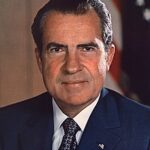The Saturday Night Massacre Decision
On October 20, 1973, President Richard Nixon ordered the firing of Special Prosecutor Archibald Cox. Cox had been investigating the Watergate scandal and demanding White House tape recordings. Attorney General Elliot Richardson refused Nixon’s order and resigned in protest. Deputy Attorney General William Ruckelshaus also refused and resigned immediately. ⚠️ Solicitor General Robert Bork finally carried out the dismissal as acting attorney general.
The Constitutional Crisis Unfolds
The Saturday Night Massacre created an unprecedented constitutional crisis in American history. Nixon’s actions appeared to obstruct justice and abuse executive power. The president eliminated the independent prosecutor investigating his own administration’s crimes. 📊 Public approval ratings plummeted as Americans witnessed this dramatic confrontation. Congress and the media denounced Nixon’s authoritarian tactics against the justice system.
Immediate Political Fallout
The firing triggered massive public outrage across the United States. Impeachment resolutions flooded into Congress within days of the massacre. 🔥 Nixon’s credibility suffered irreparable damage among Republicans and Democrats alike. The decision backfired spectacularly, intensifying rather than ending the Watergate investigation. A new special prosecutor was appointed within weeks to continue Cox’s work.
Impact:
Accelerated Path to Impeachment
The Saturday Night Massacre dramatically accelerated Nixon’s downfall and impeachment proceedings. 📉 Congressional support for Nixon collapsed among both parties after the firings. House Judiciary Committee began formal impeachment inquiries within months. The massacre provided clear evidence of obstruction of justice charges. Nixon’s desperate attempt to end the investigation instead guaranteed his political destruction.
Constitutional Precedent and Reform
The crisis established crucial precedents for executive power limitations in American democracy. Congress passed the Ethics in Government Act to protect future special prosecutors. ⚖️ The massacre demonstrated that no president stands above the law or justice system. Courts gained stronger independence from executive interference in criminal investigations. These reforms strengthened checks and balances against presidential abuse of power.
Long-term Democratic Impact
The Saturday Night Massacre fundamentally changed American attitudes toward presidential authority and government transparency. 🌍 Public trust in government institutions declined significantly following Nixon’s actions. The event became a cautionary tale about executive overreach in democratic societies. Future presidents faced greater scrutiny and accountability from Congress and courts. The massacre remains a defining moment in the ongoing struggle between power and justice.
